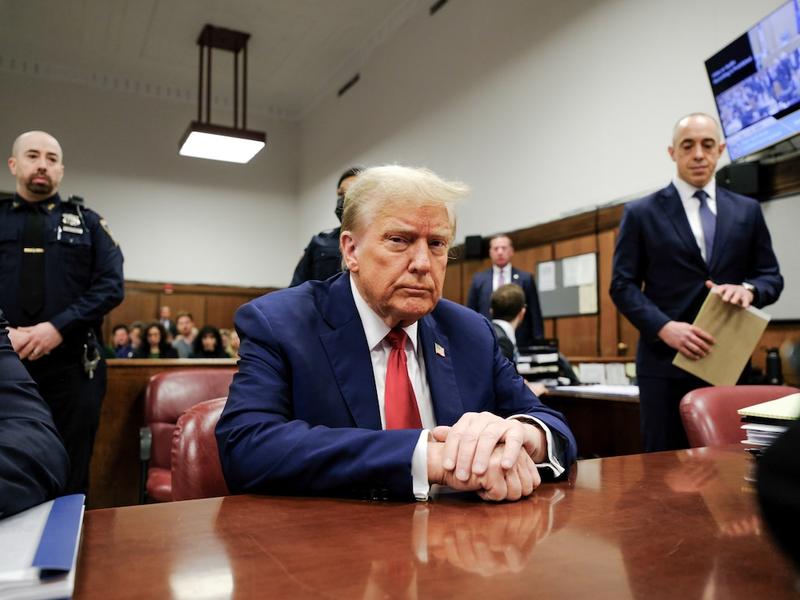
The current political moment reminds me of the story about the guy who had one foot in a pot of boiling water and the other foot in a bucket of ice. On average, he was quite comfortable.
Indeed, in politics, we too often focus on averages—the overall numbers—which even if accurate can obscure much more than they reveal. In this period of extreme partisanship, colossal differences in the attitudes of Democrats and Republicans tell more of the story, while the voting behaviors of independents are more akin to the overall average.
The Quinnipiac University national poll taken Feb. 11-14 and released Monday afternoon is a great example of the partisan distinctions. When asked, “Would you like to see Donald Trump play a prominent role in the Republican Party or not?” 60 percent of Americans responded that they did not want Trump to play a prominent role, 34 percent did. But 75 percent of Republicans, and independents who lean Republican, answered that they did want him to, while just 21 percent did not. Among Democrats and Democratic-leaning independents, 96 percent of Democrats said they didn’t want him to play a large role, and 3 percent did (probably because they thought it would hurt Republicans). True to form, 61 percent of independents did not want Trump to play a big role, while 32 percent did.
In that same Quinnipiac poll, when asked, “Do you think former President Trump is responsible for inciting violence against the government of the United States, or don't you think so?” 89 percent of Republicans responded no, while 96 percent of Democrats said yes. By an 11-point margin (52 to 41 percent), independents thought Trump was responsible, nearly identical to the 11-point split among all respondents (54 to 43 percent).
Almost no matter the question, the differences between attitudes of partisans on each side is enormous, but it also explains the behavior of elected officials.
David Lauter, a terrific reporter and 40-year veteran of the Los Angeles Times who first covered politics in Washington in 1981—President Reagan’s first year in office—explored the question of why GOP members of Congress continue to back Trump. His answer: “They’re representing their voters.”
For a candidate, one way of looking at voters is putting them in concentric circles. The circle closest to the middle is your party base, the next circle is made up of those in your party but maybe not quite so rock-solid. Then in the outer circles are the independents who lean toward your side followed by pure independents who don’t lean toward either side.
Many elected officials define their constituents as only those citizens who probably will vote for them, or at least will consider it, i.e., the center circles. Anyone else, not so much. One can say that increasing numbers of elected officials are representing parties more than people or, to a certain extent, places. That’s why they do what they do. Call it spineless if you want, but the survival instinct in humans is very strong. As William Galston of the Brookings Institution has said, “There’s a reason why Profiles in Courage is a very short book. Courage is not the norm. It’s the exception.”
But keep in mind that if a candidate loses their primary race, they may never make it onto the general-election ballot. (An exception is Sen. Lisa Murkowski, who won reelection as a write-in candidate in 2010 and will benefit in 2022 from a new, top-four primary system and ranked-choice voting.
As for those voters who aren't in the base, they not only might they never vote for you to begin with, but they also tend to feel less passionately about almost everything and tend to vote in lower numbers than partisans on either side.
The real-world implications of this disparity was pointed out with relish this week by the inimitable George Will in his syndicated column. Will wrote unless President Trump is marginalized within the GOP base, Republican primary voters next year could reenact the painful outcomes for the GOP from 2010 and 2012. In those years, the party nominated candidates in a number of states that—in my words not Will’s—would fit into the bar scene in the original Star Wars, costing the party seats. He warned that 2022 could be "perhaps the most crucial non-presidential election year in U.S. history."
A few hours later, The Wall Street Journal’s Siobhan Hughes reported that Senate Minority Leader Mitch McConnell is prepared to intervene in Republican primaries next year if it looks like there’s a real threat of an unelectable candidate winning the GOP nomination and costing the party a seat in the general election. Apparently McConnell hasn’t forgotten those races from a decade ago.
So what are the electoral implications for the seven GOP senators who voted to convict in the impeachment trial?
Two, Richard Burr (North Carolina) and Pat Toomey (Pennsylvania) had already announced their retirement, so they didn’t have to worry about electoral implications.
Three were just reelected in November and won’t be back up for six years: Susan Collins (Maine), Ben Sasse (Nebraska), and Bill Cassidy (Louisiana). Cook Political Report Senate/Governor Editor Jessica Taylor astutely points out that Louisiana no longer has partisan primaries, so Cassidy's challenge would be in a somewhat less inhospitable general election in 2026.
That leaves Mitt Romney, who declared his independence of worrying about such things some time ago and won’t be up again until 2024.
This article was originally published for the National Journal on February 16, 2021.










Subscribe Today
Our subscribers have first access to individual race pages for each House, Senate and Governors race, which will include race ratings (each race is rated on a seven-point scale) and a narrative analysis pertaining to that race.